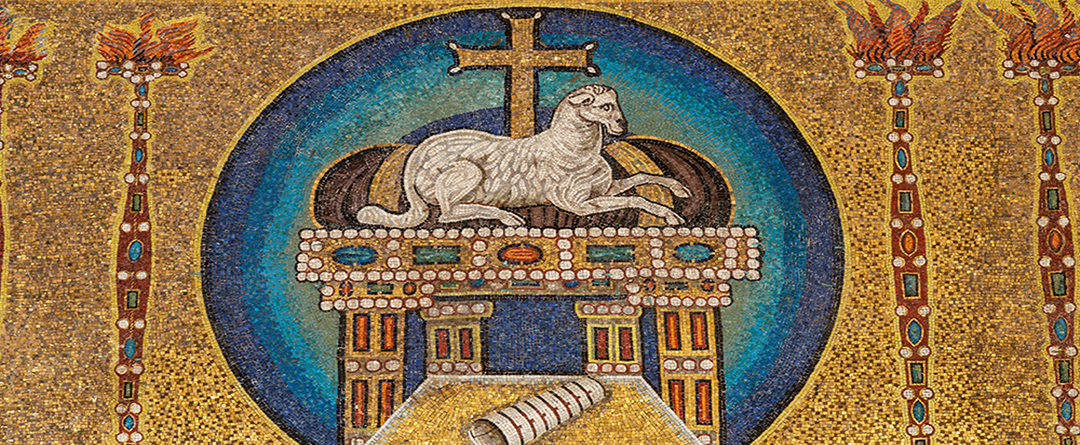“Then I saw in the right hand of the one seated on the throne a scroll written on the inside and on the back, sealed with seven seals, and I saw a mighty angel proclaiming with a loud voice, “Who is worthy to open the scroll and break its seals?” And no one in heaven or on earth or under the earth was able to open the scroll or to look into it. And I began to weep bitterly because no one was found worthy to open the scroll or to look into it.” (Revelation 5:1-4)
This passage in Revelation takes place in a resplendent heavenly throne room. God gleams like a jewel and is attended by four living creatures singing about God’s glory. Behind them stand twenty-four elders, humbly casting their golden crowns at the feet of the Sovereign God.
Amid such splendor, our attention is drawn to a sealed scroll in God’s hand. Wax seals once were affixed to royal decrees, wills, and other official documents to indicate that no one had tampered with the authoritative pronouncement inside. This particular scroll has not one, but seven seals, suggesting that what it contains is both very secure and very significant.
An angel calls out, “Who is worthy to open the scroll and break its seals?” (Rev. 5:2) The response is deafening silence. No one in that majestic company is found competent or deserving of revealing God’s message for the world. No wonder the narrator weeps. How tragic to think of the precious Word of God right in front of us, but we have no access to it!
A dejected young pastor heard this text shortly after leaving his first congregation. No amount of seminary training had prepared him for being asked to resign from his call. The congregation felt he could not meet their needs; he was exhausted and unfulfilled by trying to do just that. Still smarting from his perceived failure as a church leader, feeling ashamed and incompetent, he joined in weeping at the discovery that no one could be found worthy to convey God’s truth to the world. Certainly, he did not feel worthy.
A soon-to-be ex-wife kneels on the floor, praying for guidance amid her crumbling marriage. She acknowledges that she has made a mistake in marrying her husband and also that she will be making a mistake in leaving him. She had promised to love him forever, and she remembers being admonished at their wedding: “What God has joined together let no one put asunder.” Yet, her misery reached such a point that she knows she had to leave. She is failing to keep her solemn vow, disappointing everyone—including God, it seemed. She does not feel worthy.
Back in the throne room in Revelation, one of the elders cries out, “The Lion of the tribe of Judah has gained the victory!” (Rev. 5:5). The image of a lion was associated with the tribe of Judah, the tribe from which kings came. Surely a majestic lion would be able to subdue wickedness and reveal God’s desires for the world! But when the narrator turns to look, he sees not a mighty lion but “a Lamb standing as if it had been slaughtered” (Rev. 5:6)!
 The Lamb, often a symbol of gentleness, sacrificial wounds still streaming, stands alive and triumphant. He had been found worthy. Jesus is the Lamb, and even in his post-resurrection visits is always marked with scars. He did not destroy or conquer and enslave his enemies. He’d been arrested, beaten, mocked, found guilty in a kangaroo court, and executed among common criminals. No one I know describes these marks of success.
The Lamb, often a symbol of gentleness, sacrificial wounds still streaming, stands alive and triumphant. He had been found worthy. Jesus is the Lamb, and even in his post-resurrection visits is always marked with scars. He did not destroy or conquer and enslave his enemies. He’d been arrested, beaten, mocked, found guilty in a kangaroo court, and executed among common criminals. No one I know describes these marks of success.
This Lamb-Lion gathered people of every tribe and nation to a community of grace, and taught, fed, and healed them. Ultimately, the Lamb willingly endured immense suffering and death to ensure that they would be free from the weight of failure. Throughout the rest of the book of Revelation, this Lion-Lamb proves victorious over God’s enemies (17:14), is enthroned with God (22:1-3), and forever shepherds God’s people (7:17). Apparently, God’s views of success and failure do not align with what we’ve come to believe.
Nowhere is this paradox more evident than in the seeming disaster of Jesus’ crucifixion. As the Lamb unjustly bleeds his life away, God is busily, quietly transforming pain and self-giving love into redemption. In ways no one who perceives lions as mighty and slaughtered lambs as meek could imagine, God works through the cross to bring new life and hope and courage and forgiveness to the unworthy. Followers of the Lion-Lamb are marked not by their virtue or wisdom or power or might, but by the baptismal crosses on their foreheads. They do not earn their place among God’s holy people. They receive it as a gift.
This is Good News for a dejected pastor, a new divorcee, and all who feel like failures.
Whatever you have done or left undone, the Lion-Lamb of God calls you “Beloved.” The God who creates and redeems the world invites us to participate in continuing Jesus’ work among those who most need to hear that failing at something does not make them failures. For this, let us give thanks with the psalmist who rejoices, “My flesh and my heart may fail, but God is the strength of my heart and my portion forever.” (Psalm 73:26)
Closing prayer:
God, when we feel like we are failures and mourn that the whole world is unworthy of spreading your message of love, remind us that Jesus comes among us as a Lion, summoning all to God’s way of justice, and as a Lamb, pouring out compassion and grace on our behalf. Amen.
Discussion questions:
1. Remember a time when you felt unworthy. Who or what helped you once again see yourself as beloved?
2. When we pray, “Thy kingdom come,” do we imagine Jesus showing up as a Lion or as a Lamb?

